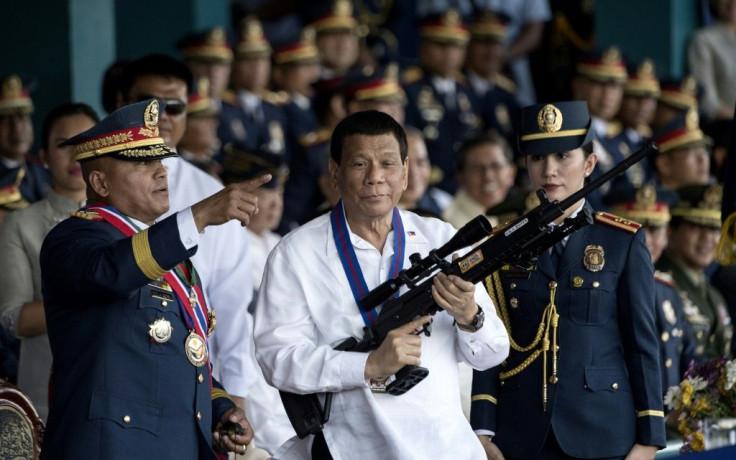Duterte Threats To Oust US Troops From Philippines A Ploy To Protect Against Sanctions

Philippine President Rodrigo Duterte, facing international pressure from human rights advocates over his war on drugs and possible repercussions over it, has renewed a longstanding threat to sever security cooperation with the United States. Recent travel bans by the U.S. on Filipino officials involved in alleged human rights abuses appear to be the catalyst of the threats.
The president’s umbrage at the U.S. is also evident with his ever-warming relationship with China and its leader Xi Jinping, railing against America’s military presence on Philippine soil as a major source of tensions, while consistently overlooking China’s aggressive actions in the South China Sea.
At stake is the Philippine-U.S. Visiting Forces Agreement (VFA) that was negotiated soon after the closure of American military bases in the Philippines in the early 1990s. It provides the legal framework for U.S. soldiers to enter the Philippines. It also provides the operating software for U.S. troops stationed in the country on a rotating basis, often in the south in terrorism-prone regions.
A non-existent or minimal U.S. military presence would benefit the communist-atheist country whose long-range goals appear to be total control of the South China Sea and its riches trapped beneath the waters.
What does Duterte stand to gain by his threats and fondness for China? The short-term gain to the Philippines is an influx of cash by the Chinese to a growing, but still poor country. The potential drawback is a financial debt to Beijing that will not be paid back and with little military resistance, allow the Chinese to exert more control over the archipelago.
The Philippines constitution currently limits the presidency to one six-year term and at age 74 and with some health issues Duterte will step down in 2022. Once out of office he will be vulnerable to sanctions and possibly criminal charges of human rights abuse over alleged extrajudicial killings from the drug war.
By denying American access to strategic Philippine bases, the Filipino leader may be hoping to deter any sanctions against himself and his inner circle in the coming months and years, especially after 2022.
The most prominent “insider” is Senator Bato Dela Rosa, a former Philippine National Police (PNP) Chief who oversaw the most brutal phase of Duterte’s drug war. His U.S. diplomatic visa was revoked over his connection to the drug war.
Upon hearing of the revocation Duterte angrily told local media, “Now they won’t let Bato (dela Rosa) go to America. I am warning you…if you don’t do the correction there. One, I will terminate the bases, Visiting Forces Agreement. I will end that son of a b---h.”
Philippine senators and other government officials are mixed as to if Duterte can act alone to end the VFA. Some suggest that the upper house would have to approve Duterte’s scrapping of the VFA. Some top government officials disagree, maintaining that Duterte can unilaterally abrogate the agreement without legislative approval.
If Duterte chooses to opt-out of the VFA, will it be for reasons of protecting the sovereignty of the Philippines or to keep himself and his cronies from facing the consequences of his war on drugs? The reason will not matter to China, standing by and waiting patiently as they battle the new coronavirus.
© Copyright IBTimes 2024. All rights reserved.




















